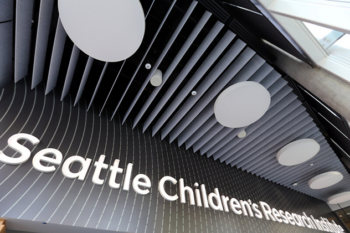Research Highlights: Equity Initiatives Improve Infection Rates; Cell and Gene Therapy Progress; Malaria Study
6.8.2023 | Casey Egan, Empress Rivera-Ruiz and Colleen Steelquist
 As one of the nation’s top four pediatric research centers, Seattle Children’s Research Institute remains dedicated to providing hope, care and cures to help every child live the healthiest and most fulfilling life possible.
As one of the nation’s top four pediatric research centers, Seattle Children’s Research Institute remains dedicated to providing hope, care and cures to help every child live the healthiest and most fulfilling life possible.
On the Pulse takes a look at some of the highlights from across the research institute over the past month.
Equity Initiatives Improve Healthcare-Associated Infections
Seattle Children’s researchers detected higher rates of central line-associated bloodstream infections (CLABSI) in patients who identify as Black and in those who use a language other than English for medical care, which persisted after adjusting for factors that influence CLABSI risk.
After a multidisciplinary team from Seattle Children’s identified disparities and initiated equity-focused quality improvements, rates for both groups significantly improved. The team’s findings were recently published in JAMA Pediatrics.
The paper details equity strategies for CLABSI prevention. Learn more about how equity Initiatives impacted infections.
Researchers Share Progress at ASGCT Conference
Pivotal research from Seattle Children’s Research Institute’s Center for Immunity and Immunotherapies (CIIT) was showcased at the American Society of Gene and Cell Therapy’s (ASGCT) Annual Meeting in May.
Researchers from around the world attend the conference, with the work of only a small percentage selected for presentations each year.
More than 20 CIIT scientists attended this year’s event, and members of the labs of Drs. Richard James, Carol Miao and David Rawlings presented posters and abstracts highlighting advancements in novel cell therapies to treat cancer, Type 1 diabetes, hemophilia and more. Learn more about the progress shared at the ASGCT meeting.
CGTLive also spoke with Miao on-site at ASGCT to discuss the research presented by her lab at the conference.
Second Malaria Gene Linked to Drug Resistance
Researchers in the Center for Global Infectious Disease Research at Seattle Children’s Research Institute and an international team of colleagues have found a second gene is involved in malaria’s resistance to the antimalarial drug chloroquine, upending a long-held belief that only one gene contributes to drug resistance.
These findings, published recently in the journal Nature Microbiology, show the complexity of drug resistance and have implications for the ongoing global battle against malaria. Learn more about the second malaria gene linked to drug resistance.